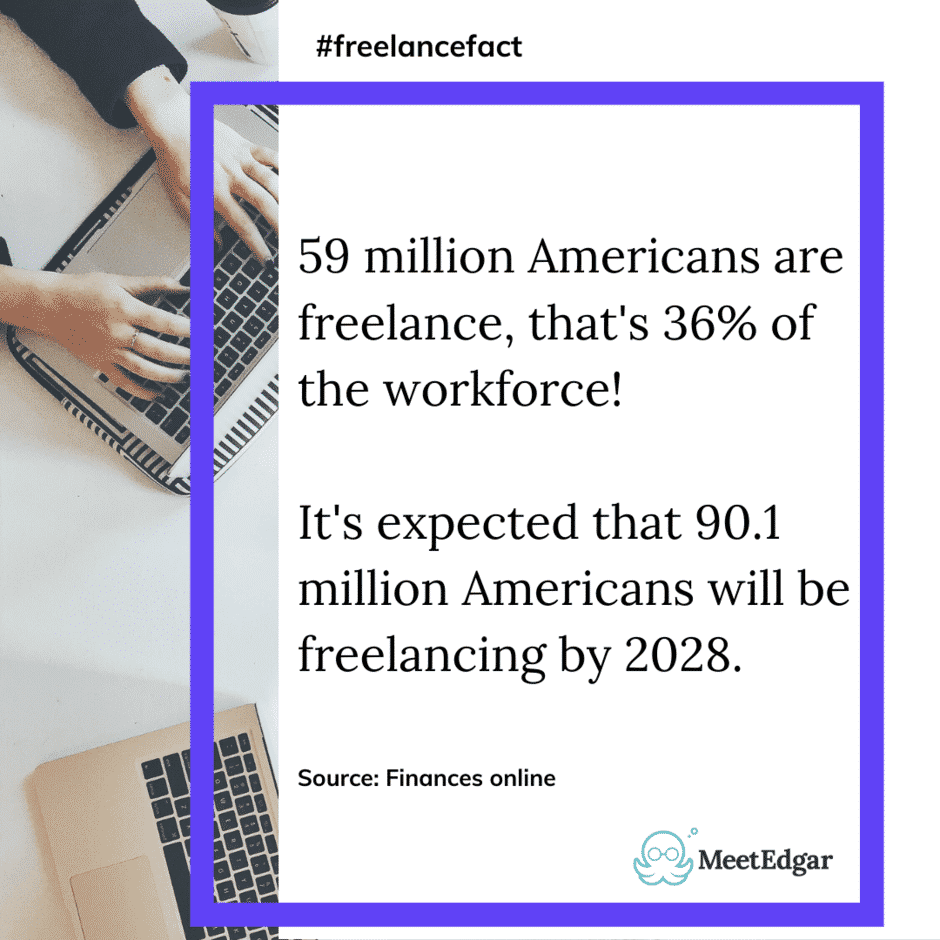Have you ever been at a party and hesitated when someone asked, “So what do you do?”
You can’t just say “I’m the boss, applesauce.” [Well, actually, this is what Edgar says, but it might confuse people if you say it!]
Do you say, “I work for myself” or do you say “I’m a freelance XYZ” or do you launch into a 2-minute pitch about your growing startup?
Your answer to this question might be more than your go-to party line. It might indicate the choices you need to make in your business and how you can grow it.
What’s a solopreneur vs entrepreneur? A freelancer vs entrepreneur? Don’t worry. We’re here to break it down for you.
Depending on whether you call yourself a solopreneur, entrepreneur, or freelancer, you might need to take different actions and use various tools to keep your business growing.
What is a Freelancer?
Contrary to the phrase, there is nothing “free” about freelancers! (Edgar’s joke, he moonlights as a stand-up for entrepreneurial clubs.)
According to Merriam-Webster, a freelancer means “a person who acts independently without being affiliated with or authorized by an organization” or “a person who pursues a profession without a long-term commitment to any one employer.”

Freelancing is becoming a much more popular self-employment option as many companies rely on flexible workforces. As of 2020, 59 million Americans were doing freelance work, that’s 36% of the nation’s workforce! It’s expected that the number of Americans freelancing will grow to 90.1 million by 2028.
There’s no surprise here since there are plenty of perks of freelance life, like working from home, making your own hours, and setting your income level.
Freelancers typically exchange time for money using marketable skills to complete projects for different companies. They work more toward supporting other companies than creating their own products or additional revenue streams outside of their freelance services.
Of course, freelancers are self-employed and can enjoy all the fun perks of working for yourself, like choosing your hours, setting your prices, and, of course, working in your pajamas (or pantsless as Edgar prefers!). And they love it! 51% of freelancers say no amount of money would get them to take a traditional job. #LoveWhatYouDo
Freelancers typically focus on strengthening their specific skills, so they can charge more and take on more complex projects. In fact, 45% of full-time freelancers who left a traditional job say they participate in more training and education than when they were full-time employees.
You may be wondering what is the difference between freelance vs self-employed? There isn’t one. Freelancers are self-employed; they pitch to potential clients themselves and manage their work schedules alone.
Freelancers are also responsible for filing their taxes and organizing their healthcare policy. The companies freelancers work for will not typically do this for them.
Here’s an example of a freelancer:
Edgar is a freelance graphic designer. He earns his income by working with 5-7 different clients creating graphics for their organizations every month. Edgar gets paid for the number of hours he works or deliverables he completes.
The TL;DR on Freelancers:
- Work alone
- Trade time for money
- Hired by other companies to complete projects
- Focus on growing skills and expertise over a business
- Responsible for admin on their income (tax, pension, healthcare)
What is a Solopreneur?
Solopreneur is a newer term that has spiked in popularity as entrepreneurship has become trendier over the last few years.
Like freelancers, solopreneurs work alone, but instead of working for other companies and trading time for money, they are building a business they can run entirely on their own. They are a solo entrepreneur.
Solo Entrepreneurship Businesses
The comparison between a freelance vs entrepreneur is pretty clear but the lines are maybe a little more blurred between a solopreneur and an entrepreneur.
Solopreneurs build businesses based on their passions or skillsets like freelancers do, but they don’t just exchange time for money. The business they built, brings in income even when they’re not working. The Solopreneur businesses don’t hire other team members but they may occasionally hire freelancers to help them with specific tasks.
Solopreneurs prioritize business growth by building systems, automating tasks, and finding new revenue streams to continue to grow their income level.
Here’s an example of a solopreneur:
Edgar is a design consultant. He consults with companies and entrepreneurs on how to create their brand designs.
He sells branding courses and teaches others how to apply branding in their businesses. Edgar earns money by spending his time consulting and teaching (which he charges at a premium because he spent years refining his craft). He also sells his expertise through courses (which he can do when he sleeps!).
The TL;DR on Solopreneurs
- Work alone
- Build a business they can run on their own
- Create revenue generation streams that don’t sole rely on investing their time
- Focus on systems and streamlining business activities
What are Entrepreneurs?
Finally, we have entrepreneurs. This is the group that your mind usually conjures up when it imagines self-employment. Not all entrepreneurs wear hoodies and live in Silicon Valley, but they do have a few things in common.
Entrepreneurs have a big vision of growing a big business, including building a team to support that business and possibly securing funding or looking for a buyout by a larger company.
Whereas freelancers and solopreneurs want to improve their specific skills, entrepreneurs want to improve their businesses. They are quicker to delegate and hire team members to do the actual work inside of the company while they work on the business strategy.
Solopreneur vs Entrepreneur
What is the critical difference between the two? Solopreneurs don’t work with an in-house team; entrepreneurs do.
Unlike freelancing and solopreneurship, many entrepreneurs seek funding during growth, which means they don’t have to become profitable quickly.
Entrepreneurs are likely playing a long game to profitability, while solopreneurs and freelancers have to become profitable, or else, they’re out of business!
(We should note here that not all entrepreneurs seek funding. Many bootstrap their businesses – as MeetEdgar did!)
Here’s an example of an entrepreneur:
Edgar is running a graphic design agency. His tentacles rarely get wrapped up in design. Instead, he focuses his time on managing his team, finding new clients, creating partnerships, and creating new revenue streams.
The TL;DR on Entrepreneurs
- Quick to build teams
- Often secure funding or are looking for a buy-out
- Work more ON their business than in their business
Before we go any further, we have to add that there is no subset of self-employment better than the other! The differences are only based on specific goals and which type of business feels good to you and fits your lifestyle. No matter which path you choose, it’s essential to recognize that you are a business owner and operating as a business. No matter your answer to “So what do you do?” if you are self-employed, you’re a business owner!
How to Grow Your Business as a Freelancer
Two things will help you grow your freelance business: attracting new clients and improving your skills (so you can charge more or take on bigger clients).
Since attracting clients is what brings in the revenue (which allows you more time to improve your skills), you should structure your days to reach new potential clients is your number one task.
And there are a few hundreds of ways that you can do that!
- Network in-person at local events
- Cold call or cold email potential leads
- Network online in Facebook groups, LinkedIn groups, Twitter chats or on Instagram
- Create content that addresses your prospective client’s pain points and create lead magnets so you can connect with them
Even if you have current clients, you never want your pipeline to dry up! Prospecting and lead generation should always be a top priority. Then, you should dedicate time to improving your craft, whether that’s taking courses, working on personal projects, or reading articles.
You can prioritize these two things by automating other parts of your freelance business, such as:
- Invoicing
- Sending proposals
- Setting up appointments
- Client onboarding
- Social media marketing
If you’re able to automate (or delegate these things), then you’ll be able to dedicate your most precious resource, time, to the things that will grow your business.
How to Grow Your Business as a Solopreneur
Many solopreneurs earn their income through their expertise, so their priorities should be to show off their expertise, grow an audience, and look for other revenue opportunities.
You know what that means… it’s time to talk about content marketing, baby!
Content marketing is the best way to show off your unique style and expertise, whether it’s a podcast, a YouTube channel, a blog or an email newsletter.
You can use those efforts to grow your audience of prospective clients by using lead magnets to grow your email newsletter list or obtain relevant contact information.
Social media is an obvious choice for growing their audience, but solopreneurs might want to take it a step further by pitching themselves for guest posts, speaking opportunities, or interviews to reach larger audiences.
Much like freelancers, solopreneurs have to find a way to scale the tasks that don’t directly relate to growing an audience, attracting new prospects or creating new revenue opportunities, such as:
- Project management
- Lead generation
- Managing your email inbox
- Social media management
Creating processes and systems that will streamline and automate these tasks will contribute to more growth for solopreneurs.
Check out our list of 20+ Tools for Solo Businesses for useful tools that will automate these tasks for you!
How to Grow Your Business as an Entrepreneur
Unlike solopreneurs and freelancers, entrepreneurs rarely work alone. The key to growth for entrepreneurs is three things: securing funding, developing and communicating your mission, and growing a team.
As you grow your business, your mission needs to remain clear and you need to find people to fund your business and work for your business who believe in that same mission.
As the entrepreneur and founder, it will fall on you to create the vision and relay that vision to your team to work efficiently and effectively.
One process that entrepreneurs can create is onboarding and hiring so that every new hire is on board and clear with the vision and mission of your organization. (You can learn a little bit about how we do this at MeetEdgar here).
Are You A Freelancer, Solopreneur Or Entrepreneur?
Do you know what makes you lucky? If you’ve made it to the end of this article, you know that being your own boss is your path.
You get to decide which type of self-employment works best for you. Consider your goals, lifestyle, and ideal working situation to make the decision.
This also isn’t a lifetime decision. (What a relief, right?!) Your business might evolve. If you’re a solopreneur today, you could change your business model and become a freelancer. If you’re a freelancer, you can create new revenue streams, hire a team and become an entrepreneur.
Perhaps you’re an entrepreneur, and weigh up the difference between an entrepreneur vs freelancer lifestyle and decide you’d rather work solo and become a freelancer or solopreneur. The choice is yours.
So whether you call yourself a freelancer, solopreneur, or entrepreneur, the team here at MeetEdgar is cheering you on.
Don’t forget; you don’t need to go it completely alone! There are tools, communities, and resources out there. Download our list of 20+ tools for solo business owners.




